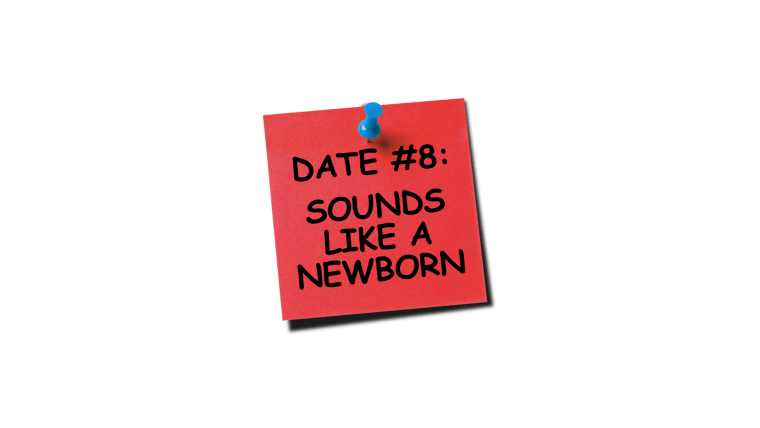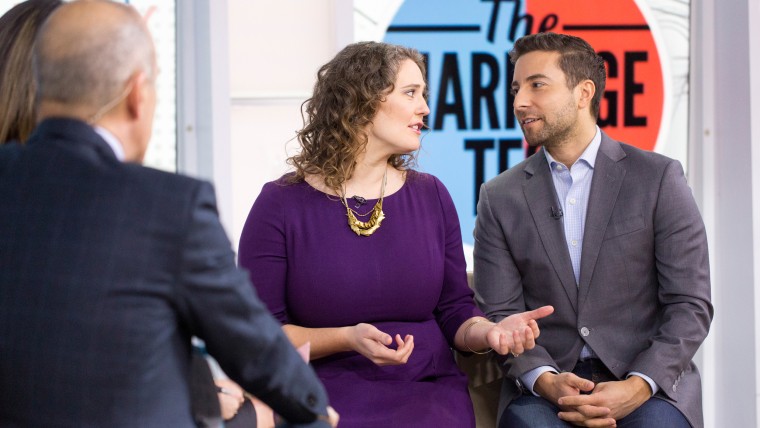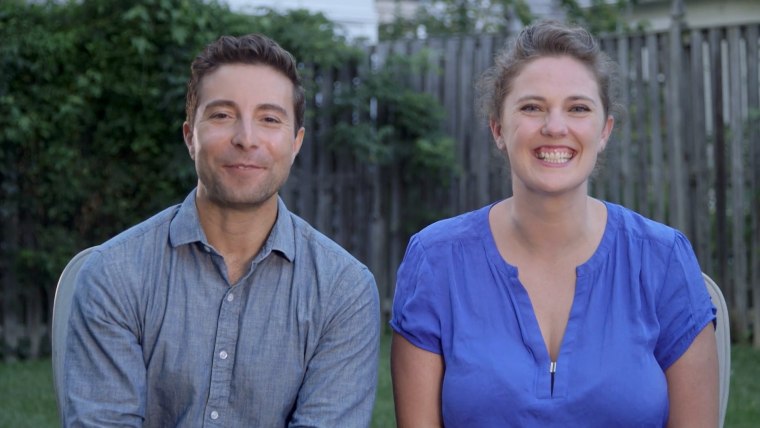How do you know if the one you're dating is THE one?
Jill Andres and Brook Silva-Braga asked that question in their new memoir, "The Marriage Test," by taking their relationship on a marital test drive. The couple created 40 experimental dates to simulate the challenges of marriage, testing everything from financial to parenting stresses.
From Jill and Brook:
We designed 40 dates to be easily accessible to any couple, so most of the activities cost next to nothing and can be done in or near your home. We used them to help us make the “big decision” but many of the challenges can be useful to couples in any relationship stage.
Here are five of our favorites from "The Marriage Test":

Money
Date No. 4: Trading Credit Cards
You’re swapping credit cards for a month so you can only buy things with the other’s money. Don’t peek at your bank balance; it’s more fun (and a more useful exercise) to spend their money without knowing how they’re spending yours. At the end of the month (or however long you make it), discuss your thoughts on shared finances.

Kids
Date No. 8: Sounds Like a Newborn
Only for the truly brave: You’re signing up for a week of sleeplessness, setting an alarm to wake you up every three hours during the night. Before going back to bed, you’ll have to do a chore you pull out of a hat. Bounce your “baby” for 10 minutes. Do a load of laundry. Walk around the block with your “baby.” Cook a meal. You’ll need a “baby” — we bought a watermelon. Add your own tasks to the ones we mentioned —they’re allowed to be useful. Any chore that goes faster if you both help is especially . . . interesting. And no naps!
RELATED: Will your relationship last? Your credit score may hold the answer
Sex
Date No. 11: Sex Notes
After a week of your best efforts, exchange feedback on what is and isn’t working in the bedroom. You could hold your own private Reddit-style “Ask Me Anything,” or create sexual “Wish Lists” to swap and discuss. Compliment sandwiches can help soften the blow of tough feedback!
Communication
Date No. 23: Play it Back
Record a fight or emotional conversation — you can wait for one to emerge organically or just record something expect to be contentious (we recorded a “discussion” of household chores). Once the dust settles, give a listen, possibly separately at first, but also ultimately together. You can stop to point out things or ask questions if you like, but don’t interrupt too much. Once you’ve both had a chance to listen and reflect, try to discuss ways to argue more constructively.
Marriage Prep
Date No. 34: Take My Name
You’re trading last names to help decide what you’ll call yourselves if you get married. Start by setting up new e-mail accounts, updating social media, and calling each other by your “swapped” names. Remember to sign your new signature after every purchase! We switched names for two weeks, but even seven days should do the trip.
To read other couples' stories or share your own, visit TheMarriageTestBook.com

Here is an excerpt from Jill Andres and Brook Silva-Braga's memoir, "The Marriage Test."
BROOK: I remember sitting on the couch, staring at a dead TV, trying to breathe. “You hungry?” Jill asked when she walked into our apartment. She was just getting back from a friend’s bachelorette weekend in New Orleans. “We should talk first,” I said. She put down her bag and I could see the color drain from her face until it matched mine. “Let me go to the bathroom first,” she said, and I sat there waiting, counting the breaths until I blew up our lives.
At that point we’d been together for nearly four years in the best, most serious relationship either of us had known. A mutual friend invited us to the same small party and Jill was the first person I noticed, the energetic, strong-willed center of the room. Blue eyes and brown curls. I was smitten. Within a couple of months we were inseparable, hanging out six nights a week all over New York City. She was funny and smart and we liked the same trashy bars and could talk all night about that science story in the Times or why Mexican food sucks on the East Coast.
RELATED: Complaining just might be the secret to a happy relationship
At first it was platonic, then it wasn’t; either way it was like magic just being together. You know that scene in a rom-com where the couple first meets? Every day felt like that. “Dad, how do you know when you’re really in love?” “Son, you’ll know when you know.” I never had that conversation with my dad, but you get the idea. I knew. After three years together she was still the best friend I’d ever had. And we moved in together. And people thought we were getting married. And all along the whole thing had been fucked.
Sitting on the couch, I couldn’t quite say why it was fucked. I could only just barely tell that it was. It’s awfully hard to look at a relationship honestly when you’re still in it. After the fact, we all pretend the problems were easy to see. But when you’re still trying to keep it alive — because of love or comfort or fear— everything seems curable. For a long time we were stuck in that dark, undiagnosed place. Nothing is perfect. How good is it really supposed to be before we commit our lives to each other? How do we know which side of that line we’re on?
RELATED: 12 couples share their secrets to a long and successful marriage
Picking a partner is the most important decision any of us will ever make, but how are we supposed to make it? Being in love is obviously a good start, but the things that ultimately wreck marriages — money and monogamy, career and kids — are hard to practice for until you’re actually hitched. What if she spends too much? What if I’m a bad dad? You can be together for years without ever truly auditioning each other for the Big Job.

And that’s what Jill and I did. We comfortably drifted along, talking about that article we just read and why East Coast burritos are bad. We stoically ignored that our relationship was dying — until Jill came out of the bathroom with a box of tissues to sit with me on the couch for our funeral. Four good years, gone like that. They were garbage now, a mistake, a waste, something to be vaguely embarrassed about. And the scariest part was, we just as easily could have gotten married without realizing what a bad idea that was.
JILL: Brook and I sat there on the couch and cried for a long while. His decision to end it was like the last chapter of a mystery novel: At first it was surprising and then I realized the whole story had been a collection of hints pointing to this end. First let’s fondly remember the misdirections: We loved each other more than we’d ever loved anyone else and had an incredible amount of fun. We shared adventures across five New York boroughs and four continents. Best of all, we were super-positive influences on each other. Brook nudged me toward grad school, I helped him plant roots. We were, I swear, great together in so many ways.
RELATED: Couple spills secrets to their 82-year-long marriage
But a couple can fall in love and stay in love and still be wrong for each other. Even during the best of times, there were quiet reservations, things we felt but would never say. Like the fact that we struggled to connect sexually. We were always affectionate, but for some reason that failed to translate into a fulfilling sex life. That’s just what happens when you go from being platonic friends to partners, I told myself. Or the fact I never really felt optimistic about our future. Friends would say they’d never heard anyone in such a strong long-term relationship use the phrase “If things work out between us” so often. Being conservative is a normal reaction to falling in love, right?
Pairing off may be humanity’s core function, but we’re still totally shit at it. This is where I should mention the 50 percent divorce rate. Except the U.S. divorce rate is probably closer to 40 percent. The precise number is impossible to say because the data are poorly kept and no one knows what percentage of people married two years ago will end up divorcing. But a University of Michigan economist projected that if current trends continued, only about 35 percent of marriages would end in divorce.
The divorce rate has actually been inching lower since 1980, which sounds like good news until you hear how we’ve done it. For decades Americans got married at roughly the same average age: twenty-four for men, twenty-one for woman. But since 1980 the age has gone way up; it’s now over twenty-nine for men and twenty-seven for women. Our generation seems to think we can avoid repeating the baby boomers’ mistakes by putting off commitment.
At thirty-four and thirty-one, Brook and I were precocious examples. I had always figured marriage could wait. Why stop traveling, going out, and building a career? I’m having fun dating this guy, let’s not rush it. Marriage could wait a little longer. And a little longer.
It seems to me both trends — divorcing and dithering — are driven by marriage’s cruel paradox: It’s really hard to know if you’ve chosen the right person until you’ve already married them.
RELATED: Would you get married alongside 9 other couples? Meet the latest nuptial trend
The night Brook and I broke up, we were able to talk in a way we’d always avoided when we were a couple. We told each other stuff that had been too hard or awkward before. Even the sex stuff. We had come so close to ending up together without ever mustering the courage to face our true shortcomings as a couple.
I left town to go backpacking through Asia; Brook took over the lease on our apartment. We moved on, we dated other people, we rarely spoke.
And that probably would have been the last sentence of our story if I hadn’t received a note from Brook about a year later: “Hey, I’m getting kicked out of the old apartment,” he wrote. “Gonna have a New Year’s Eve party as a send-off. You should come!” It seemed like a bad idea. But all my friends will be there, I told myself.
At midnight those friends were confused why I wasn’t huddled around the TV counting down to the New Year. I was on the roof, watching fireworks over the Hudson River, kissing Brook. He’d taken me aside earlier in the night and said he missed me.
I knew it violated the breakup handbook, but over the next few months we started casually seeing each other again. Eight months later, when Brook moved south for a job with the Washington Post, we took an even bigger step: I followed him to D.C. and we moved back in together. Brook and Jill, version 2.0.
And it felt different — healthier, more open. Old patterns changed. I felt like Brook appreciated me in a new way. And I believed he’d become more worthy of my appreciation. The good stuff hadn’t really changed; we still had as much fun as ever. And I really did think (and most days hoped) Brook could be my husband. But let’s be honest: I’d already thought that once before.
RELATED: Is your current partner 'The One'? Here's how to find out
BROOK: I guess we came up with this project because we were afraid to make the same mistake twice. The idea came to us on a sunny summer evening after work, in a rented kayak on the Potomac River. It was one of those warm and easy days — good weather, good jobs, good health — the kind of perfect moment we’re all dumb enough to think might last forever if we just keep waiting for the right person. Or, if we’re sick of waiting, it’s the kind of blue-sky day that tricks an incompatible couple into saying “I do.”In the distance the sun was setting on our adopted city, the sky around the Washington Monument turning a burnt orange. We had been together a year in this new relationship and it seemed to be headed somewhere serious. But before we took that big step toward forever, maybe we should make sure this time really was different. Maybe we should make sure we weren’t avoiding or ignoring something important.
“What if we made like an obstacle course of challenges to see if we’d be good at being married?” Jill suggested.“That would be hilarious. We could borrow a baby for the weekend and see if it survived.”
“What if we went on a date with our exes?”
“Oh my God, that would be so awkward,” I said.
“Do you think they’d do it? Don’t all your exes hate you?”
“At least one of them doesn’t,” I joked. Jill dipped her oar against the current and splashed me across the face.
RELATED: 5 relationship warning signs couples should never ignore
It sounded like the kind of fun, quirky adventure we’d always been good at. And honestly, at the time, we were naïve enough to think we’d pass with flying colors. We got out of the kayak, grabbed our phones, and typed out as many of the ideas as we could remember.
Swap credit cards for a month.
Spend a week grading each other’s performance in the bedroom.
Trade phones for a weekend.
Over the next few weeks we asked friends and family to contribute date ideas. We defined “date” liberally; any activity they thought would help us reach a decision was fair game, and their suggestions seemed to cover every possible pitfall. The ideas also seemed to reveal a lot about their own relationships: a recently engaged woman kept suggesting more adventurous sex, my chronically single coworker was fixated on in-laws, and a married friend who was about to become a dad seemed to suggest we should see other people. We scaled down his idea and turned it into our first activity: speed dating.
We realized pretty quickly that they were more than funny stunts. The dates would help force the “should we or shouldn’t we” decision we had continued to put off. They would help us understand if our relationship was built to last by actively simulating the strains of marriage.
Most of the ideas fell into a handful of thematic buckets, so we started to group them and soon found ourselves with ten categories, a kind of Daters’ Decathlon. And then we gave our Marriage Test the ultimate stakes. If it went well, we’d spend our lives together. If not, we were done for good.
From "The Marriage Test: Our 40 Dates Before “I Do”: A Memoir by Jill Andres and Brook Silva-Braga, published by arrangement with Berkley, an imprint of Penguin Random House LLC. Copyright © 2016 by Jill Andres and Brook Silva-Braga.